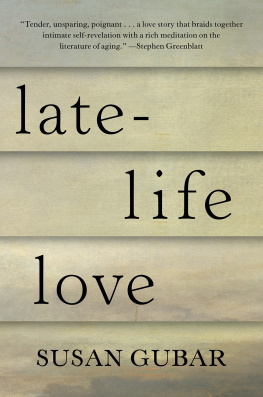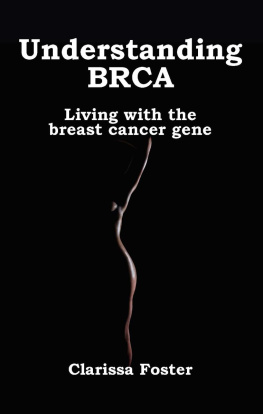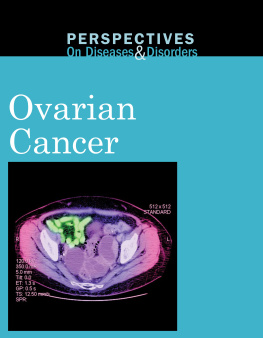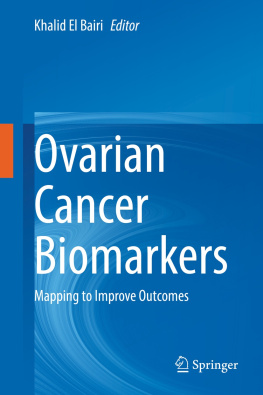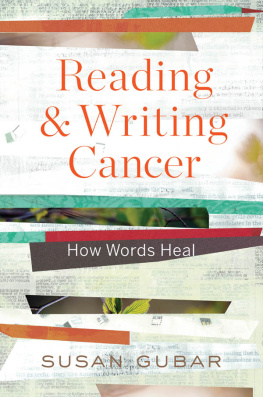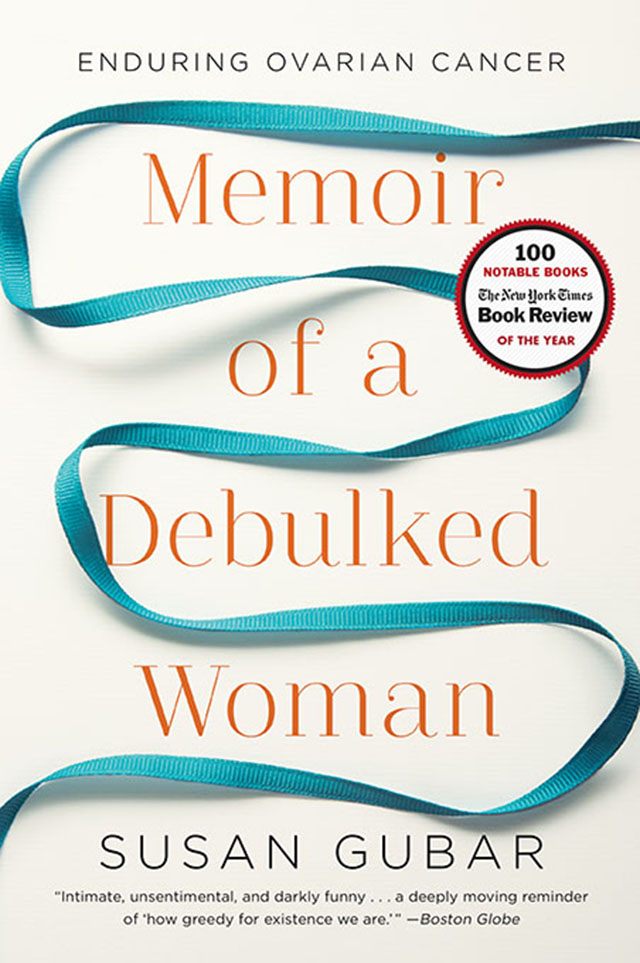
ALSO BY SUSAN GUBAR
The Madwoman in the Attic (with Sandra M. Gilbert)
Shakespeares Sisters (with Sandra M. Gilbert)
The Norton Anthology of Literature by Women
(with Sandra M. Gilbert)
No Mans Land (with Sandra M. Gilbert)
For Adult Users Only (with Joan Hoff)
English Inside and Out (with Jonathan Kamholtz)
MotherSongs (with Sandra M. Gilbert and Diana OHehir)
Masterpiece Theater: An Academic Melodrama
(with Sandra M. Gilbert)
Racechanges: White Skin, Black Face in American Culture
Critical Condition: Feminism at the Turn of the Century
Poetry After Auschwitz
Rooms of Our Own
Feminist Literary Theory and Criticism
(with Sandra M. Gilbert)
Lo largo y lo corto del verso Holocausto
Judas: A Biography
True Confessions: Feminist Professors Tell Stories Out of School
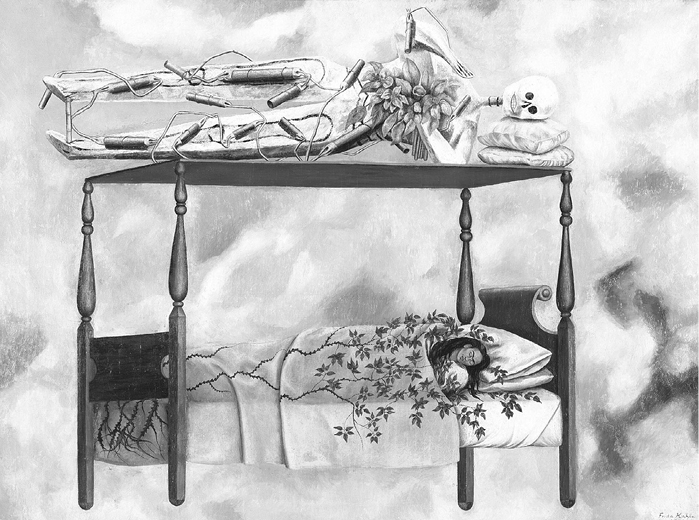
MEMOIR
OF A
DEBULKED
WOMAN
Enduring Ovarian Cancer
SUSAN GUBAR
W. W. NORTON & COMPANY
NEW YORK LONDON
FOR DON
CONTENTS
FOREWORD
I GO ON THE Web, click Favorites, and scroll down to a site with hundreds of testimonials from grandmothers, mothers, daughters, sisters, husbands, sons, aunts, and nieces. Each recounts her own or a relatives medical history, often concluding with advice:
Please dont give up and stay strong because miracles happen.
I want to tell people that you can deal with anything that life throws at you.
I just want to say to everyone who is dealing with this or any type of cancer, KEEP THE FAITH AND KEEP GOD FIRST BECAUSE GOD HAS THE LAST WORD.
If you are fighting this fight, keep a smile on your face and think good thoughts.
On bookshelves too, there are many urgent instructions from brave people trying to triumph over or grapple with sickness. Quite a few of their maxims seek to sustain hope in patients and caretakers struggling with disabling and frightful circumstances. My story, lacking directives, will not help them, a fact that fills me with consternation. It is not comforting. I often wanted to give up coping with experiences that made me miserable with my existence. How can I justify a disquieting account that may only heighten anxieties in such an understandably distraught population?
In no way do I mean doubtfulness about my personal fate to infect the spirit of others in need of resilience and grit. Being true to what I have undergone hardly excuses hardheartedness or cynicism. For those who have reason to believe or need to believe that their cancer is curable, please remember that this book is not about you. Imagine instead that it comes from someone in your local support group or someone posting letters on your listserv message board, the sort of site that contains questions, requests, reactions from individual patients in the midst of treatment. Her experiencesmy experiencesneed not be yours, for yours will and should be exceptional, uniquely your own. You are sharing her (or my) concerns, but not her (or my) conditions. I did not write this book in order to disabuse the hopeful of their hopefulness or to promote pessimism. Who would want to be such a spoiler?
Rubbing a readers nose in repugnant body disorders strikes me as a revolting and perverse act. The thought of people I know and people I dont know acquiring intimate information about the most private aspects of my being twists me into knots. I worry, will these people, the known and the unknown, be embarrassed of or for me since at many moments I am ashamed of myself? Yet a compulsion to relate my encounter with disease and its treatments drove me in part because I suspected (and continue to suspect) that my story could not be quite as anomalous as it appears to be. Beyond a potentially misguided effort to relate my physical, mental, and emotional states to those of others who have described their acquaintance with disease and its treatments, my central motive consists of a fierce belief that something must be done to rectify the miserable inadequacies of current medical responses to ovarian cancer.
The composition of this narrative kept me sane during a hard time. It let me come to terms with my attitudes toward death, with my ideas about the resonant role played by the arts as we live with awareness of death, and also with my family history and the loves of my life. Only while in the midst of the writing and treatment processes did I fully realize that my personal travails, like those of many, are grounded in widely sanctioned health-care protocols. At least at times, therefore, I take an activists stance. Go little book, I want to say, do some good work in the world. Like throwing stones in a lake, Mom, one of my daughters ruefully cautions. Still, I pray that its polemic will rapidly sound outdated and unneeded, that it will become an anachronism or historical curiosity quite soon, as soon as possible, sooner than possible.
DIAGNOSIS
W HEN I HEARD the diagnosis of ovarian cancer on November 5, 2008, I assumed it was a death sentence. Lying on a gurney in a hospital hallway, I concentrated on accepting my impending mortality with equanimity. Scientific advances have not yet made a significant impact on detection or treatment and ovarian cancer remains largely incurable.
The January 2010 Mayo Clinic website contests my judgment by suggesting that medical science has progressed far enough for us to jettison depressing assumptions. Until recently, MayoClinic.com states, ovarian cancer was known as a silent killer because it usually wasnt found until it had spread to other areas of your body. But new evidence shows that most women may have symptoms even in the early stages, and awareness of symptoms may hopefully lead to earlier detection. Upbeat as these sentences sound, note the hedges and qualifiers: most women may have symptoms and awareness of symptoms may hopefully lead to earlier detection. A standard guide to ovarian cancer, produced by Johns Hopkins University Hospital, opens with related but different assurances, namely that the informed patientreader die of ovarian cancer, a blunt doctor explains in a novel by Richard Powers.
What do women experience between diagnosis and death or, within a narrower framework, during initial and successive treatments? There were 21,550 new cases of ovarian cancer that occurred in the United States in 2009, and an additional 14,600 women died from it. It used to be estimated that one out of seventy American women will get the disease, the deadliest of all gynecological cancers, though recently the number sometimes cited is one in fifty-five. There are very few published personal accounts for them to consult since for decades, indeed for centuries, women have generally maintained silence about the silent killer. Possibly theirs were not stories about being quite comfortable with their physicians language or treatments. Possibly the disintegration of the body stalled the composing of narratives or despondency attendant upon the disintegration of the body took its toll. Soon after the diagnosis, I realized that my quirky responses and encounters could not possibly convey the tribulations of all the variously situated women who struggle to endure between diagnosis and death, but certain factors in my background and situation would make it possible for me to find the few accounts that do exist and to record what has thus far gone unrecorded. I have frequently in the past set out to investigate matters that I wanted to write about. So I began to inquire into the disease and to write about it and its medical treatment. Even at the moment of diagnosis, my age, family history, and scholarly habits helped me to accept the disease and then to describe subsequent medical responses.
Next page

